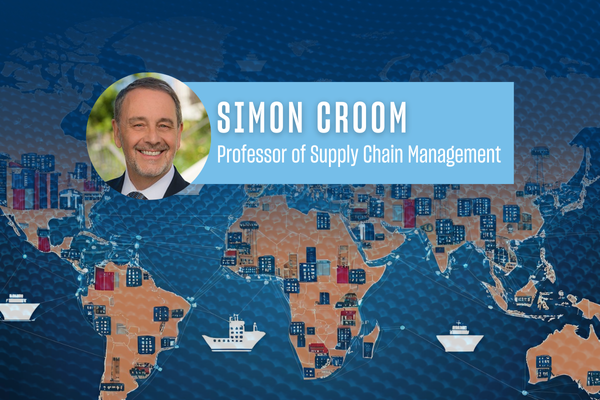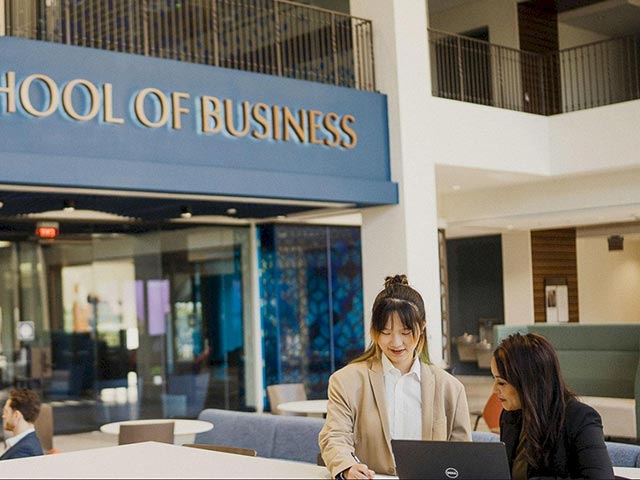The Impact of Global Trade Policies on Supply Chain Strategy

Global trade policy uncertainty is now the top concern for 69% of supply chain executives, according to a 2024 Gartner survey. Trade policies are reshaping business at an unprecedented pace, presenting challenges and opportunities for leaders managing supply chains. As tariffs shift, trade agreements evolve, regulations tighten and supply chain leaders navigate an increasingly complex landscape.
Audio produced by Hubspot using AI narration.
Thoughtful leaders are pivotal in aligning business strategies with these dynamic policies, driving resilience, ethical sourcing and strategic agility in an interconnected global market. By anticipating changes and understanding their implications, these leaders can ensure that their organizations remain competitive and adaptive in a rapidly evolving world.
To see how USD’s Master of Science in Supply Chain Management program equips you to turn these shifting dynamics into strategic advantages, explore our MSSCM Curriculum Guide.
The Leadership Perspective: Why Trade Policies Matter to Supply Chains
Trade policies affect nearly every aspect of supply chain operations, from sourcing and production to distribution and customer satisfaction. Policies such as tariffs, trade agreements and sanctions can profoundly impact costs, supplier relationships and market access.
“The resurgence of protectionist trade policies—tariffs as high as 25% on imports from major partners like China, Mexico and Canada—has disrupted demand forecasting and inventory planning across industries,” explains USD professor Simon Croom.
“At the same time, deglobalization trends are driving companies to realign supply chains toward Southeast Asia and Mexico, while export controls on critical technologies add further complexity. To navigate these shifts, leaders must diversify their supplier base, invest in advanced analytics and AI for real-time visibility, strengthen compliance programs and build resilience through adaptable strategies,” Croom says.
For business leaders, the challenge lies in striking a delicate balance between cost efficiency, resilience and ethical considerations while staying compliant with ever-changing regulations. Adopting a global perspective is essential; leaders must anticipate potential policy shifts, assess associated risks and adjust their supply chain strategies accordingly. By doing so, they not only ensure operational continuity but also position their organizations to seize emerging opportunities in a competitive landscape.
Ethical and Strategic Impacts of Global Trade Policies
Regarding ethical considerations, companies are increasingly held accountable for upholding international labor standards and promoting sustainable practices throughout their supply chains. Ensuring that workers receive fair wages, operate in safe conditions and have their human rights protected is no longer optional—it is a critical component of maintaining an ethical and reputable supply chain.
“Modern slavery and labor exploitation remain persistent challenges, especially in upstream tiers where opacity and subcontracting obscure abuses,” notes Croom. “Our research shows that integrating risk-based financial pricing into supply chain finance—penalizing unethical suppliers and rewarding sustainable practices—creates a multiplier effect on economic and social value. Technologies such as blockchain, IoT and AI further enhance traceability and transparency, enabling organizations to align ethical sourcing with cost efficiency.”
Moreover, the growing emphasis on sustainability means businesses must adopt greener practices. This often involves investing in renewable energy, optimizing transportation routes to reduce carbon emissions and committing to sustainable sourcing practices.
Such measures not only fulfill regulatory requirements but also resonate with consumers who are increasingly demanding environmentally responsible business practices.
From a strategic perspective, global trade policies are prompting companies to rethink their sourcing strategies. To mitigate risks associated with trade restrictions and tariffs, many businesses are diversifying their supplier base and exploring alternative manufacturing locations.
This shift toward a more diversified approach reduces dependency on any single region and helps cushion against localized disruptions. At the same time, leaders face the challenge of balancing cost efficiency with long-term sustainability.
Although integrating green technologies and environmentally responsible processes may incur higher initial expenses, these investments often lead to significant long-term savings and enhance strategic resilience.
Recent Policy Shifts and Their Implications
Recent global trade developments have underscored the need for adaptable supply chain strategies. For instance, ongoing tariff negotiations and restrictions in US-China trade relations have compelled companies to reassess their reliance on Chinese suppliers, prompting the exploration of alternative markets and suppliers.
Similarly, Brexit has had a profound impact on European supply chains. The UK's exit from the European Union disrupted traditional trade routes, introduced new regulatory requirements and increased operational costs, forcing companies to reconfigure their supply networks to navigate the new landscape.
The transition from NAFTA to the USMCA agreement between the United States, Mexico and Canada has redefined trade rules across North America. This updated agreement not only modernizes trade practices by addressing issues such as digital commerce and labor standards but also encourages businesses to streamline their operations across the region.
These policy shifts have increased operational costs and altered supplier dynamics, prompting companies to adopt more agile procurement and production strategies. In this context, logistics and inventory management must evolve to accommodate changing trade barriers and regulatory landscapes, requiring greater adaptability and enhanced communication with international partners.
Strategic Leadership in Global Trade and Supply Chain Management
In an era marked by rapid policy changes and global uncertainties, strategic leadership has never been more critical. Strategic leaders with a proactive mindset are investing in building resilience through diversification and technological innovation. Expanding sourcing options by partnering with multiple suppliers across different regions mitigates risks and ensures supply chains against unforeseen disruptions such as natural disasters or political instability.
Simultaneously, investments in advanced technologies—ranging from AI-driven demand forecasting to real-time supply chain visibility software—empower leaders to make informed, data-driven decisions that keep their organizations ahead of the curve.
Technology also plays a crucial role in anticipating and responding to regulatory changes. Adopting predictive analytics and compliance software allows companies to forecast potential challenges before they materialize, streamlining global trade operations and ensuring adherence to new policies.
Strategic collaboration and partnerships are essential for aligning supply chain strategies with global trade policies. By working closely with international partners, companies can achieve smoother trade operations and ensure robust regulatory compliance. Industry alliances and public-private partnerships provide valuable insights, timely policy updates and shared best practices, all of which enhance a company’s ability to navigate an ever-changing global market.
How USD’s Knauss School Prepares Leaders for Global Trade Challenges
At the Knauss School of Business, leaders are prepared to navigate the intricate challenges of global trade through a well-rounded approach that combines a rigorous curriculum and practical hands-on learning.
“USD’s Master of Science in Supply Chain Management is designed to mirror the complexities of global trade,” says Croom. “Our curriculum covers international negotiations, law and ethics, finance and risk management, while the Supply Chain Management Institute offers company visits, plant tours and industry mentorships. Delivered in a flexible hybrid format, the program equips working professionals with the tools to implement sustainable, ethical and innovative supply chain strategies from day one.”
USD’s Master’s in Supply Chain Management program is designed to impart a deep understanding of supply chain management, global trade and sustainability, equipping students with both the theoretical foundations and the practical skills needed to excel in today’s dynamic business environment.
Students engage in immersive case studies and simulations that present real-world trade scenarios, compelling them to develop strategic decision-making abilities in a controlled, learning-focused setting. Partnerships with leading global businesses provide opportunities for networking, internships and mentorship, bridging the gap between classroom theory and real-world application. These experiences ensure that graduates are well-prepared to implement innovative and adaptable strategies in the face of global trade challenges.
The Future of Global Trade and Thoughtful Leadership
Looking ahead, several trends are set to shape the future of global trade and supply chain management. Sustainability will continue to be at the forefront as governments and corporations push for greener initiatives, driving innovations in sustainable technologies that influence production methods and waste management across supply chains.
At the same time, the evolution of regional trade agreements is expected to redefine global sourcing and logistics strategies, compelling companies to balance the advantages of localized trade networks with the benefits of international markets.
In this dynamic environment, the role of thoughtful leadership becomes increasingly significant. Leaders who can seamlessly integrate innovation with strategic agility and ethical responsibility will be best positioned to navigate the challenges of global trade in their learning, fostering diverse and inclusive teams, and crafting strategies that address both immediate challenges and future opportunities, these leaders will not only drive business success but also contribute to the creation of supply chains that are resilient, sustainable, and socially responsible.
Trade policies may significantly influence supply chains, yet the transformative power of thoughtful leadership can convert these challenges into opportunities for innovation and growth. With strategic foresight, ethical decision-making, and a commitment to leveraging cutting-edge technology, leaders can build supply chains that are not only agile and efficient but also future-ready.
Take the next step by exploring the Master’s in Supply Chain Management program at the University of San Diego’s Knauss School of Business. Discover how our specialized curriculum, hands-on learning experiences, and industry partnerships empower you to master global trade complexities and drive sustainable success. Learn more about the Master’s in Supply Chain Management program or explore career opportunities in supply chain management.






